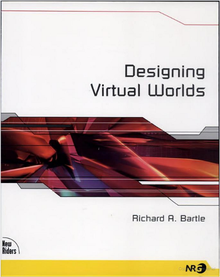- Designing Virtual Worlds
-
Designing Virtual Worlds 
Author(s) Richard Bartle Country United States Language English Genre(s) Non-fiction Publisher New Riders Publication date 2003 Media type Print (Paperback) Pages 741 ISBN 0-1310-1816-7 Designing Virtual Worlds is a definitive work on the practice of virtual world development by Richard Bartle, the father of MUDs. It has been called "the bible of MMORPG design"[1] and spoken of as "excellent",[2] "seminal",[3] "widely read",[4] "the standard text on the subject",[5] "the most comprehensive guide to gaming virtual worlds"[6] and "a foundation text for researchers and developers of virtual worlds"[7] that is "strongly recommended for anyone actually thinking about building one of these places"[8] and "describes the minimum level of competency you should have when discussing design issues for virtual worlds".[9] It has been noted as an authoritative source regarding the history of world-based online games.[10] Its coverage of the virtual world design process has been called "a step further than most [books] in game design instruction".[11] In less favorable reception, one reviewer, while calling it a "must-read" work, said he found "much that was questionable, incomplete, or just erroneous" in it.[12] College courses have been taught using it.[13][14][15][16]
Designing Virtual Worlds has been noted for its arguments that the fundamentals of player relationships to the virtual world and each other are independent of technical issues and are characterized by a blending of online and offline identity,[17] that players do not know what will provide them with a positive game experience, that being the designer's role,[18] and that the purpose of virtual worlds is the player's exploration of self,[19] as well as for its expansion of the earlier 4-type Bartle gamer style taxonomy into an 8-type model[20] and its focus on the practicalities of its subject.[21]
References
- ^ Sempere, Andrew (2009-10-01). The Work of Art in the Age of Virtual Production. IBM Research. http://andrewsempere.org/chart2009/CHArt09_asempere_paper.pdf. Retrieved 2010-05-05.
- ^ Jennings, Scott; Macris, Alexander (2005-12-19). Massively Multiplayer Games For Dummies. For Dummies. pp. 7. ISBN 0471752738.
- ^ Zichermann, Gabe; Linder, Joselin (2010-03-29). Game-Based Marketing: Inspire Customer Loyalty Through Rewards, Challenges, and Contests. John Wiley & Sons. pp. 149. ISBN 0470562234.
- ^ Geraci, Robert (2010-03-05). Apocalyptic AI: Visions of Heaven in Robotics, Artificial Intelligence, and Virtual Reality. Oxford University Press. pp. 95. ISBN 0195393023.
- ^ "Participants". Living Game Worlds IV. Georgia Institute of Technology. 2008-12-01. http://gameworlds.gatech.edu/2008/participants.html. Retrieved 2010-05-06.
- ^ Book, Betsy (10 2004). "Moving Beyond the Game: Social Virtual Worlds". State of Play Conference 2 (New York Law School). http://www.virtualworldsreview.com/papers/BBook_SoP2.pdf. Retrieved 2010-05-06.
- ^ Levy, Luis; Novak, Jeannie (2009-06-22). Game Development Essentials: Game QA & Testing. Delmar Cengage Learning. pp. 119. ISBN 1435439473.
- ^ Castronova, Edward (12 2003). "On Virtual Economies". Game Studies 3 (2). http://www.gamestudies.org/0302/castronova/. Retrieved 2010-05-06.
- ^ Green, Brian (2003-12-24). "untitled comment". Terra Nova. http://terranova.blogs.com/terra_nova/2003/12/reputation.html#c418184. Retrieved 2010-05-06.
- ^ Williams, J. Patrick; Smith, Jonas Heide (2007-03-28). The Players' Realm: Studies on the Culture of Video Games and Gaming. McFarland & Company. pp. 31. ISBN 0786428325.
- ^ Croce, Nicholas (2007-01-30). Cool Careers Without College for People Who Love Video Games. Rosen Publishing Group. pp. 30. ISBN 1404207473.
- ^ Rickey, Dave (2003-08-12). "If you can't say anything nice...". Engines of Creation. Skotos. http://www.skotos.net/articles/engines06.shtml. Retrieved 2010-05-06.
- ^ Castronova, Edward (2004-08-26). "Virtual Worlds 101: Draft Syllabus". Terra Nova. http://terranova.blogs.com/terra_nova/2004/08/virtual_worlds_.html. Retrieved 2010-05-06.
- ^ Thomas, Douglas (2004-12-10). "COMM 499: Massive Multiplayer Online Games". University of Southern California. Archived from the original on 2005-02-14. http://web.archive.org/web/20050214233753/ascweb2.usc.edu/~comm499/. Retrieved 2010-05-06.
- ^ Delwiche, Aaron (2004-12-10). "COMM 3344: Games for the web". Trinity University. http://www.trinity.edu/adelwich/mmo/. Retrieved 2010-05-06.
- ^ Kipp, Neill A. (2003-12-05). "CSC 5807 — Special Topics". University of Colorado Denver. Archived from the original on 2004-07-31. http://web.archive.org/web/20040731190135/www.cse.cudenver.edu/Courses/Spring/5807.pdf. Retrieved 2010-05-06.
- ^ Wallace, Mark (2006-01-31). "In Celebration of the Inner Rogue". the escapist (30): 1–2. http://www.escapistmagazine.com/articles/view/issues/issue_30/182-In-Celebration-of-the-Inner-Rogue. Retrieved 2010-05-06.
- ^ Klastrup, Lisbeth (05 2007). "Why Death Matters: Understanding Gameworld Experience". Journal of Virtual Reality and Broadcasting 4 (3). ISSN 1860-2037. http://www.jvrb.org/archiv/1022/. Retrieved 2010-05-06.
- ^ Koster, Raph (2006-01-05). "Traits, stories, and holy grails". Raph Koster's Website. http://www.raphkoster.com/2006/01/05/traits-stories-and-holy-grails/. Retrieved 2010-05-06.
- ^ Yee, Nick (06 2005). "Motivations of Play in MMORPGs: Results from a Factor Analytic Approach". Proceedings of the DiGRA Conference 2005 (DiGRA). http://www.nickyee.com/daedalus/motivations.pdf. Retrieved 2010-05-06.
- ^ Klastrup, Lisbeth; Tosca, Susana (2004). "Transmedial Worlds — Rethinking Cyberworld Design". Proceedings of the 2004 International Conference on Cyberworlds (IEEE Computer Society): 409–416. http://www.itu.dk/people/klastrup/klastruptosca_transworlds.pdf. Retrieved 2010-05-06.
External links
Categories:- Books about the internet
- Books about video games
- MUD texts
- Texts related to the history of the Internet
Wikimedia Foundation. 2010.
